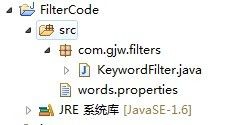- 如何搭建自己的知识体系?
lindake
数据库
随着学业增长,发现自己曾经完成过很多很棒的作品,但是都只是分门别类躺在了移动硬盘里,现在想搭建一个属于自己的数据中心,但是无从下手。目前对于数据库的基本构想是:1、可以多平台多设备浏览使用,上传云端,但不会像某项商业网盘那样,因为些敏感词之类的导致数据丢失。(我自己搭建了群晖系统)2、每份数据可以加上多个tag,比方说#课程名称#授课老师#课程类型等。只要我搜索某个tag,例如,某个老师的名字,我
- 敏感词替换为星号
raziya-askar
python
编写一个函数,接收一个字符串参数,将其中的敏感词替换为星号,并返回替换后的结果。defgetReplace(s):wordList=["阿里巴巴","苹果","亚马逊","京东","字节","脸书"]forwordinwordList:s=s.replace(word,"*"*len(word))returnsprint(getReplace("阿里巴巴、亚马逊、字节和脸书是世界上最知名的公司之一
- Java 结合elasticsearch-ik分词器,实现评论的违规词汇脱敏等操作
八百码
elasticsearch大数据搜索引擎
IK分词(IKAnalyzer)是一款基于Java开发的中文分词工具,它结合了词典分词和基于统计的分词方法,旨在为用户提供高效、准确、灵活的中文分词服务。注意:需要自己建立一个敏感词库,然后自己选择方式同步到elasticsearch中,方便比对操作话不多说,直接上后台代码这个依赖是我使用的,可以结合自己的情况自己选择适用版本的相关依赖org.elasticsearchelasticsearcho
- javaEE——过滤器
404_NOT_FOUND@
JavaEEjava-eejava
1.过滤器简述Filter也称之为过滤器,它是Servlet技术中最实用的技术,WEB开发人员通过Filter技术,对web服务器管理的所有web资源:例如Servlet,从而实现一些特殊的功能。例如实现URL级别的权限访问控制、过滤敏感词汇、压缩响应信息等一些高级功能。2.过滤器的作用对服务器web资源进行拦截(权限控制,通过拦截资源进行权限控制,是否可以访问)3.过滤器怎么创建?Servlet
- hive sql实现查找商品表名称中包含敏感词的商品
lixia0417mul2
大数据hivesqlhadoop
背景用户上传的商品表一般会包含商品名称,由于这些商品名称是用户自己起的,里面可能包含了敏感词,需要通过sql找出来哪些商品的商品名称包含了敏感词汇hivesql实现查找商品表名称中包含敏感词的商品实现思路:1.商品表和敏感词表进行join时的连接条件设置成namecontains敏感词的形式2.一般来说join的on条件都只是需要有一个equal等值连接,所以我们每个表设置一个虚拟列,仅仅是为了满
- 频繁锁文为哪般?
微方_5279
刚刚要继续日更,结果看到昨天写的《即使得,也要做个无症状感染者》被锁了,我自认为是爱国爱生活有觉悟的好公民,但是这是近一个月来第三次被锁文了,前两次还提出申述了,尽管没有同意,但是还是想试试,这次干脆连申述的想法都没有了,随它吧!上篇小文只是记叙了身边人中招了的症状和现状,不知道哪句话成为了敏感词,网络警察好敬业啊!我只是想通过这个平台记录生活的点点滴滴,让自己时时感受到生活的乐趣,不至于每天浑浑
- phpcms v9敏感词内容替换
大海哪蓝
PHPCMSphp
后台先在"扩展"——>"敏感词管理"中添加敏感词,然后修改phpcms\modules\content\content.php文件来实现添加或者编辑内容时敏感词的替换。(如果涉及会员投稿和留言等,也需要在对应模块中做类似处理)在add方法和edit方法中if(trim($_POST['info']['title'])=='')showmessage(L('title_is_empty'));下方添
- 如何在贴吧发帖不被删除
九千营销
如何在贴吧发帖不被删除!商务合作Q28110454,Q99382744,微信yisi221官网:www.xtyinliu.cn相信很多人到百度贴吧进行推广引流,全是会遇到一些下列让人崩溃的情况:帖子一发出去,就立马被删除写了很多帖子传来,最后都泥牛入海,没有生产率无缘无故的删除删,被禁封等那该如何解决这类难点?下面从七个方面来简述下:1、禁止敏感词像这种完全免费、共享资源、微信、推广方法、联接等词
- sensitive-word v0.13 特性版本发布 支持英文单词全词匹配
老马啸西风
java
拓展阅读sensitive-word-adminv1.3.0发布如何支持分布式部署?sensitive-word-admin敏感词控台v1.2.0版本开源sensitive-word基于DFA算法实现的高性能敏感词工具介绍更多技术交流业务背景对于英文单词Disburse之类的,其中的sb字母会被替换,要怎么处理,能不能只有整个单词匹配的时候才替换。针对匹配词进一步判断说明支持版本:v0.13.0有
- sensitive-word v0.13 特性版本发布 支持英文单词全词匹配
后端java
拓展阅读sensitive-word-adminv1.3.0发布如何支持分布式部署?sensitive-word-admin敏感词控台v1.2.0版本开源sensitive-word基于DFA算法实现的高性能敏感词工具介绍更多技术交流业务背景对于英文单词Disburse之类的,其中的sb字母会被替换,要怎么处理,能不能只有整个单词匹配的时候才替换。针对匹配词进一步判断说明支持版本:v0.13.0有
- sensitive-word-admin v1.3.0 发布 如何支持敏感词控台分布式部署?
后端java
拓展阅读sensitive-word-adminv1.3.0发布如何支持分布式部署?sensitive-word-admin敏感词控台v1.2.0版本开源sensitive-word基于DFA算法实现的高性能敏感词工具介绍更多技术交流业务背景如果我们的敏感词部署之后,不会变化,那么其实不用考虑这个问题。但是实际业务,敏感词总是随着时间不断变化的,所以我们需要支持敏感词的动态修改。整体设计pullv
- 【JS】一文学会正则表达式
程序员Syoyu
javascriptjavascript正则表达式
1.概述1.1什么是正则表达式正则表达式(RegularExpression)是用于匹配字符串中字符组合的模式。在JavaScript中,正则表达式也是对象。正则表通常被用来检索、替换那些符合某个模式(规则)的文本。例如验证表单:用户名表单只能输入英文字母、数字或者下划线,昵称输入框中可以输入中文(匹配)。正则表达式还常用于过滤掉页面内容中的一些敏感词(替换),或从字符串中获取我们想要的特定部分(
- 一文讲清楚Java Servlet过滤器,干货
纵然间
Javajavaservlet开发语言
一、Filter简介Filter也称之为过滤器,它是Servlet技术中最实用的技术,WEB开发人员通过Filter技术,对web服务器管理的所有web资源:例如Jsp,Servlet,静态图片文件或静态html文件等进行拦截,从而实现一些特殊的功能。例如实现URL级别的权限访问控制、过滤敏感词汇、压缩响应信息等一些高级功能。ServletAPI中提供了一个Filter接口,开发web应用时,如果
- 过滤器和拦截器总结
一路奔跑1314
JAVAEEjava服务器开发语言
过滤器和拦截器在日常业务开发中不是经常用到,近来项目中偶尔遇到了,对过滤器和拦截器进行了一次系统学习,现总结如下。一、过滤器Filter1.1什么是过滤器过滤器是Servlet的高级特性之一,是实现Filter接口的Java类。其基本功能就是对servlet的调用进行干预,在servl请求和响应的过程中增加一些特定的功能。可以使用过滤器实现的功能有:统一编码,URL级别的权限访问控制,过滤敏感词汇
- 〔转〕《我在传销待了7天!赚了1040万!》
斯威夫特_b853
(文章很长,请耐心观看,因为涉及敏感词汇,我朋友不得不把它转化成图片形式,以便让更多人看到)深刻剖析传销的本质!以一个个血的教训!图片发自App图片发自App图片发自App图片发自App图片发自App图片发自App图片发自App图片发自App图片发自App图片发自App图片发自App图片发自App图片发自App图片发自App图片发自App图片发自App图片发自App图片发自App图片发自App这不
- 文章又一次被锁定了,我也疯了
风姿绰约的葫芦娃
今天我发布了我的《与未来的一封信——第二十四封》,没想到居然被锁了,变成了仅自己可见,我立刻重新检查了文章,改掉了一个类似敏感词的地方,重新发布,结果还是被锁!我怀疑平台的锁文检测不够细致,而且模糊设置程度太大,导致我即使改了文章,系统也检测不出来。现在好歹有30个粉丝呢,就算其中有一个人一直关注我的《与未来一封信》系列,那今天岂不是断更了吗?更让我抓狂的是系统平台并不会告诉你具体哪里出了问题,而
- sensitive-word-admin 敏感词控台 v1.2.0 版本开源
敏感词安全开源github
开源目的丰富sensitive-word的生态。提供最基本的操作例子,便于在此基础上丰富实现自己的敏感词控台。避免重复开发的成本,让更多的精力专注于业务。拓展阅读sensitive-word-admin敏感词控台v1.2.0版本开源sensitive-word基于DFA算法实现的高性能敏感词工具介绍v1.2.0版本特性优化对应的组件依赖,sensitive-word同步升级到最新版本。修复已知问题
- 还有多少人正在成为那个“代价”?--1
燕勉
前几天都是娱乐圈的烂事瓜满天飞,再加上某南和某教父的专辑系列喧嚣尘上,吸引走了绝大部分的目光和流量。然而却有一个扎心的真实案例被选择性的忽略掉了。Y郊断G都已经在某些网站上成了敏感词。本来今天早上刚看到的时候也没有太在意,但是这一整天,这件事总是会时不时的从心底冒起,心有余悸的不踏实感让我有些惴惴不安。回想起去年自己亲身经历的一系列突发事件,说实话,很后怕。参照这个特例,再结合去年自己一系列的突发
- 一波三折只为更文
千禾随笔
2020年11月8日星期日晴昨天自己也有点犯二,本来完成日更后没啥事就应该去互动学习点赞留言的。在逛的时候突然想到前天日更的那篇文字还没回复留言,就去点开,一眼看到标题是临时改的“无题”,想想就换了个标题“会zhuanqian”。换完点击重新发布就去回复留言了。在回复简友留言时,总是不能发布,系统提示的一句英文,意思是没找到?我也没反应,想当然以为是有违反社区的敏感词,检查一遍,啥也没有,再试一次
- 区块链第4次学习总结----为什么区块链会分叉
zsheep
区块链区块链比特币数字货币
前言:csdn论坛对博文内容审核严格,敏感词太多,导致博文往往被误判是违规而无法发布,所以已经很长时间没有更新博客了。但是学习和研究是一个长期的过程,坚持学习才能看到希望。这段时间疫情反复,大部分时间只能居家,想起战火纷飞的战争年代,前辈学者在那么艰苦的环境下都没有中断学术研究,依然坚持做学问搞科学,我辈岂能不效仿?疫情期间减少外出,正好可以利用这段时间写一些博客。另外,我计划录一些区块链视频放到
- 墨者写作——集所有码字软件优点于一身的APP
云庭山人
墨者图标专注作者优质写作!支持云同步、历史版本、随机起名、小黑屋、敏感词检测、多维度数据统计等码字功能。这样一个码字APP好在哪里呢?最大的好处就在于界面功能简洁明了,无论是小白还是老手,都可以在极短的时间内适应,相较于Word的繁杂,这里更让写作者觉得舒心。不管之前你用了什么码字工具,在这里依旧可以流畅使用。而且多平台覆盖,可以云同步,写作随时随地,普通用户每个章节有5个历史版本,如果开通会员会
- 2022-09-23
浅酌低吟
今天,写了一篇,又被锁了,真搞不清楚,又是哪里犯了忌讳。动不动就锁文,申诉一下又解锁。是碰到了什么不可言说的高压线吗?真是十分的郁闷。该不会是设定了许多有的没的敏感词吧?细细想来,我的文章也并沒有牵址到什么敏感的东西啊!
- 锁文心情
23f7d604644a
今天发的文被锁了,我看了看有关锁文规定,怀疑一些词句敏感。没有申诉,直接改动重新发布了。也不知这篇能否解锁?以前有锁过一次,改了自认为敏感词就解了,这次没把握,就碰运气吧!我一般前一天写好,第二天早晨发,说实话,每篇文章发以前还是要再改两遍的,自认为态度认真没问题,就是文中词句可能欠斟酌,不过,也看过其他友友文被锁各种疑惑,主要是到底哪些词敏感不知道?不管怎样,锁文心情很丧,就像是辛苦孕育的孩子属
- 2018-10-17
大宝爱吃鱼_a5a9
一、做了啥01完成《孩子很丧气问我:“为什么我总是失败?”》初稿02微信选题会,报送并讨论选题03圈子值班,删除小广告,向技术部门(舒大侠)寻求圈子“敏感词汇”汇总,避免值班编辑自己屏蔽自己回复04修改升学辅导课读本的“生涯案例”、二、未做抽时间看一下其他小组的数据分析,取长补短
- 婚后夫妻到底谁管钱?这么做或许有意外惊喜
蝉衣儿
单身时一人吃饱全家不饿,一旦有了恋爱对象甚至进入婚姻生活,一切就都变了。钱虽然是个敏感词,但他值得每一对夫妻好好探讨。如果婚前两个人的财产各管各的,这样一来我们首先要面对的问题就是两个人的收入如何安排,如何才能做到合理的规划。个人而言不太喜欢AA制家庭又或者各管各的的,最好建立共同账户这样家庭财务一目了然。如果双方羞于谈钱,彼此也不清楚对方的收支情况特别容易引发猜忌,这不仅影响夫妻感情两人也难以建
- 敏感词过滤器:利用DFA算法 进行敏感词过滤
缘不易
springbootspringboot
1、实现原理简单原理如下图所示,使用了DFA算法,创建结点类,里面包含是否是敏感词结束符,以及一个HashMap,哈希里key值存储的是敏感词的一个词,value指向下一个结点(即指向下一个词),一个哈希表中可以存放多个值,比如赌博、赌黄这两个都是敏感词。2、实现方法2.1敏感词库初始化敏感词库的初始化,这里主要工作是读取敏感词文件,在内存中构建好敏感词的Map节点packagecom.examp
- java鉴黄视频/图片、敏感词过滤(黑名单,白名单,符号)(代码可直接使用)
一名落魄的程序员
java工具类/架构java音视频后端
视频鉴黄我这边采用的是在原视频的基础上进行抽帧处理,也就是将视频按规定的秒数或帧数间隔截取图片并对其进行图片的鉴黄maven:org.bytedecojavacv1.0ws.schildjave-all-deps2.5.1视频抽帧:importjava.awt.*;importjava.awt.image
- 抖音审核不予通过的5类内容
大大二二多多图图
审核不予通过的5类内容(1)视频标题违规①有诈骗嫌疑,冒用官方名义;②涉及敏感词汇、低俗不雅信息;②联系方式,其他平台的账号、电话号码、网站链接等;(2)视频内容违规①内容低俗、暴露、涉黄赌毒等;②含联系方式,如微信号、公众号、二维码、电话、网站链接等;③内容抄袭,直接搬运已有视频等;(3)恶意营销硬广告,铺垫式广告,以及低质量的营销视频(4)特殊产品①推销健康类产品;②兜售药品类③仿牌手表、包包
- sensitive-word-admin 敏感词控台 v1.2.0 版本开源
老马啸西风
wordjavalog日志
开源目的丰富sensitive-word的生态。提供最基本的操作例子,便于在此基础上丰富实现自己的敏感词控台。避免重复开发的成本,让更多的精力专注于业务。拓展阅读sensitive-word-admin敏感词控台v1.2.0版本开源sensitive-word基于DFA算法实现的高性能敏感词工具介绍v1.2.0版本特性优化对应的组件依赖,sensitive-word同步升级到最新版本。修复已知问题
- JS-正则表达式
小沐°
JS正则表达式
正则表达式(RegularExpression)是用于匹配字符串中字符组合的模式。在Javascript中,正则表达式也是对象通常用来查找、替换那些符合正则表达式的文本,许多语言都支持正则表达式正则表达式在Javascript中的使用场景:1)表单验证:用户名表单只能输入英文字母、数字或下划线,昵称输入框中可以输入中文(匹配)2)过滤掉页面内容中的一些敏感词(替换),或从字符串中获取我们想要的特定
- 深入浅出Java Annotation(元注解和自定义注解)
Josh_Persistence
Java Annotation元注解自定义注解
一、基本概述
Annontation是Java5开始引入的新特征。中文名称一般叫注解。它提供了一种安全的类似注释的机制,用来将任何的信息或元数据(metadata)与程序元素(类、方法、成员变量等)进行关联。
更通俗的意思是为程序的元素(类、方法、成员变量)加上更直观更明了的说明,这些说明信息是与程序的业务逻辑无关,并且是供指定的工具或
- mysql优化特定类型的查询
annan211
java工作mysql
本节所介绍的查询优化的技巧都是和特定版本相关的,所以对于未来mysql的版本未必适用。
1 优化count查询
对于count这个函数的网上的大部分资料都是错误的或者是理解的都是一知半解的。在做优化之前我们先来看看
真正的count()函数的作用到底是什么。
count()是一个特殊的函数,有两种非常不同的作用,他可以统计某个列值的数量,也可以统计行数。
在统
- MAC下安装多版本JDK和切换几种方式
棋子chessman
jdk
环境:
MAC AIR,OS X 10.10,64位
历史:
过去 Mac 上的 Java 都是由 Apple 自己提供,只支持到 Java 6,并且OS X 10.7 开始系统并不自带(而是可选安装)(原自带的是1.6)。
后来 Apple 加入 OpenJDK 继续支持 Java 6,而 Java 7 将由 Oracle 负责提供。
在终端中输入jav
- javaScript (1)
Array_06
JavaScriptjava浏览器
JavaScript
1、运算符
运算符就是完成操作的一系列符号,它有七类: 赋值运算符(=,+=,-=,*=,/=,%=,<<=,>>=,|=,&=)、算术运算符(+,-,*,/,++,--,%)、比较运算符(>,<,<=,>=,==,===,!=,!==)、逻辑运算符(||,&&,!)、条件运算(?:)、位
- 国内顶级代码分享网站
袁潇含
javajdkoracle.netPHP
现在国内很多开源网站感觉都是为了利益而做的
当然利益是肯定的,否则谁也不会免费的去做网站
&
- Elasticsearch、MongoDB和Hadoop比较
随意而生
mongodbhadoop搜索引擎
IT界在过去几年中出现了一个有趣的现象。很多新的技术出现并立即拥抱了“大数据”。稍微老一点的技术也会将大数据添进自己的特性,避免落大部队太远,我们看到了不同技术之间的边际的模糊化。假如你有诸如Elasticsearch或者Solr这样的搜索引擎,它们存储着JSON文档,MongoDB存着JSON文档,或者一堆JSON文档存放在一个Hadoop集群的HDFS中。你可以使用这三种配
- mac os 系统科研软件总结
张亚雄
mac os
1.1 Microsoft Office for Mac 2011
大客户版,自行搜索。
1.2 Latex (MacTex):
系统环境:https://tug.org/mactex/
&nb
- Maven实战(四)生命周期
AdyZhang
maven
1. 三套生命周期 Maven拥有三套相互独立的生命周期,它们分别为clean,default和site。 每个生命周期包含一些阶段,这些阶段是有顺序的,并且后面的阶段依赖于前面的阶段,用户和Maven最直接的交互方式就是调用这些生命周期阶段。 以clean生命周期为例,它包含的阶段有pre-clean, clean 和 post
- Linux下Jenkins迁移
aijuans
Jenkins
1. 将Jenkins程序目录copy过去 源程序在/export/data/tomcatRoot/ofctest-jenkins.jd.com下面 tar -cvzf jenkins.tar.gz ofctest-jenkins.jd.com &
- request.getInputStream()只能获取一次的问题
ayaoxinchao
requestInputstream
问题:在使用HTTP协议实现应用间接口通信时,服务端读取客户端请求过来的数据,会用到request.getInputStream(),第一次读取的时候可以读取到数据,但是接下来的读取操作都读取不到数据
原因: 1. 一个InputStream对象在被读取完成后,将无法被再次读取,始终返回-1; 2. InputStream并没有实现reset方法(可以重
- 数据库SQL优化大总结之 百万级数据库优化方案
BigBird2012
SQL优化
网上关于SQL优化的教程很多,但是比较杂乱。近日有空整理了一下,写出来跟大家分享一下,其中有错误和不足的地方,还请大家纠正补充。
这篇文章我花费了大量的时间查找资料、修改、排版,希望大家阅读之后,感觉好的话推荐给更多的人,让更多的人看到、纠正以及补充。
1.对查询进行优化,要尽量避免全表扫描,首先应考虑在 where 及 order by 涉及的列上建立索引。
2.应尽量避免在 where
- jsonObject的使用
bijian1013
javajson
在项目中难免会用java处理json格式的数据,因此封装了一个JSONUtil工具类。
JSONUtil.java
package com.bijian.json.study;
import java.util.ArrayList;
import java.util.Date;
import java.util.HashMap;
- [Zookeeper学习笔记之六]Zookeeper源代码分析之Zookeeper.WatchRegistration
bit1129
zookeeper
Zookeeper类是Zookeeper提供给用户访问Zookeeper service的主要API,它包含了如下几个内部类
首先分析它的内部类,从WatchRegistration开始,为指定的znode path注册一个Watcher,
/**
* Register a watcher for a particular p
- 【Scala十三】Scala核心七:部分应用函数
bit1129
scala
何为部分应用函数?
Partially applied function: A function that’s used in an expression and that misses some of its arguments.For instance, if function f has type Int => Int => Int, then f and f(1) are p
- Tomcat Error listenerStart 终极大法
ronin47
tomcat
Tomcat报的错太含糊了,什么错都没报出来,只提示了Error listenerStart。为了调试,我们要获得更详细的日志。可以在WEB-INF/classes目录下新建一个文件叫logging.properties,内容如下
Java代码
handlers = org.apache.juli.FileHandler, java.util.logging.ConsoleHa
- 不用加减符号实现加减法
BrokenDreams
实现
今天有群友发了一个问题,要求不用加减符号(包括负号)来实现加减法。
分析一下,先看最简单的情况,假设1+1,按二进制算的话结果是10,可以看到从右往左的第一位变为0,第二位由于进位变为1。
- 读《研磨设计模式》-代码笔记-状态模式-State
bylijinnan
java设计模式
声明: 本文只为方便我个人查阅和理解,详细的分析以及源代码请移步 原作者的博客http://chjavach.iteye.com/
/*
当一个对象的内在状态改变时允许改变其行为,这个对象看起来像是改变了其类
状态模式主要解决的是当控制一个对象状态的条件表达式过于复杂时的情况
把状态的判断逻辑转移到表示不同状态的一系列类中,可以把复杂的判断逻辑简化
如果在
- CUDA程序block和thread超出硬件允许值时的异常
cherishLC
CUDA
调用CUDA的核函数时指定block 和 thread大小,该大小可以是dim3类型的(三维数组),只用一维时可以是usigned int型的。
以下程序验证了当block或thread大小超出硬件允许值时会产生异常!!!GPU根本不会执行运算!!!
所以验证结果的正确性很重要!!!
在VS中创建CUDA项目会有一个模板,里面有更详细的状态验证。
以下程序在K5000GPU上跑的。
- 诡异的超长时间GC问题定位
chenchao051
jvmcmsGChbaseswap
HBase的GC策略采用PawNew+CMS, 这是大众化的配置,ParNew经常会出现停顿时间特别长的情况,有时候甚至长到令人发指的地步,例如请看如下日志:
2012-10-17T05:54:54.293+0800: 739594.224: [GC 739606.508: [ParNew: 996800K->110720K(996800K), 178.8826900 secs] 3700
- maven环境快速搭建
daizj
安装mavne环境配置
一 下载maven
安装maven之前,要先安装jdk及配置JAVA_HOME环境变量。这个安装和配置java环境不用多说。
maven下载地址:http://maven.apache.org/download.html,目前最新的是这个apache-maven-3.2.5-bin.zip,然后解压在任意位置,最好地址中不要带中文字符,这个做java 的都知道,地址中出现中文会出现很多
- PHP网站安全,避免PHP网站受到攻击的方法
dcj3sjt126com
PHP
对于PHP网站安全主要存在这样几种攻击方式:1、命令注入(Command Injection)2、eval注入(Eval Injection)3、客户端脚本攻击(Script Insertion)4、跨网站脚本攻击(Cross Site Scripting, XSS)5、SQL注入攻击(SQL injection)6、跨网站请求伪造攻击(Cross Site Request Forgerie
- yii中给CGridView设置默认的排序根据时间倒序的方法
dcj3sjt126com
GridView
public function searchWithRelated() {
$criteria = new CDbCriteria;
$criteria->together = true; //without th
- Java集合对象和数组对象的转换
dyy_gusi
java集合
在开发中,我们经常需要将集合对象(List,Set)转换为数组对象,或者将数组对象转换为集合对象。Java提供了相互转换的工具,但是我们使用的时候需要注意,不能乱用滥用。
1、数组对象转换为集合对象
最暴力的方式是new一个集合对象,然后遍历数组,依次将数组中的元素放入到新的集合中,但是这样做显然过
- nginx同一主机部署多个应用
geeksun
nginx
近日有一需求,需要在一台主机上用nginx部署2个php应用,分别是wordpress和wiki,探索了半天,终于部署好了,下面把过程记录下来。
1. 在nginx下创建vhosts目录,用以放置vhost文件。
mkdir vhosts
2. 修改nginx.conf的配置, 在http节点增加下面内容设置,用来包含vhosts里的配置文件
#
- ubuntu添加admin权限的用户账号
hongtoushizi
ubuntuuseradd
ubuntu创建账号的方式通常用到两种:useradd 和adduser . 本人尝试了useradd方法,步骤如下:
1:useradd
使用useradd时,如果后面不加任何参数的话,如:sudo useradd sysadm 创建出来的用户将是默认的三无用户:无home directory ,无密码,无系统shell。
顾应该如下操作:
- 第五章 常用Lua开发库2-JSON库、编码转换、字符串处理
jinnianshilongnian
nginxlua
JSON库
在进行数据传输时JSON格式目前应用广泛,因此从Lua对象与JSON字符串之间相互转换是一个非常常见的功能;目前Lua也有几个JSON库,本人用过cjson、dkjson。其中cjson的语法严格(比如unicode \u0020\u7eaf),要求符合规范否则会解析失败(如\u002),而dkjson相对宽松,当然也可以通过修改cjson的源码来完成
- Spring定时器配置的两种实现方式OpenSymphony Quartz和java Timer详解
yaerfeng1989
timerquartz定时器
原创整理不易,转载请注明出处:Spring定时器配置的两种实现方式OpenSymphony Quartz和java Timer详解
代码下载地址:http://www.zuidaima.com/share/1772648445103104.htm
有两种流行Spring定时器配置:Java的Timer类和OpenSymphony的Quartz。
1.Java Timer定时
首先继承jav
- Linux下df与du两个命令的差别?
pda158
linux
一、df显示文件系统的使用情况,与du比較,就是更全盘化。 最经常使用的就是 df -T,显示文件系统的使用情况并显示文件系统的类型。 举比例如以下: [root@localhost ~]# df -T Filesystem Type &n
- [转]SQLite的工具类 ---- 通过反射把Cursor封装到VO对象
ctfzh
VOandroidsqlite反射Cursor
在写DAO层时,觉得从Cursor里一个一个的取出字段值再装到VO(值对象)里太麻烦了,就写了一个工具类,用到了反射,可以把查询记录的值装到对应的VO里,也可以生成该VO的List。
使用时需要注意:
考虑到Android的性能问题,VO没有使用Setter和Getter,而是直接用public的属性。
表中的字段名需要和VO的属性名一样,要是不一样就得在查询的SQL中
- 该学习笔记用到的Employee表
vipbooks
oraclesql工作
这是我在学习Oracle是用到的Employee表,在该笔记中用到的就是这张表,大家可以用它来学习和练习。
drop table Employee;
-- 员工信息表
create table Employee(
-- 员工编号
EmpNo number(3) primary key,
-- 姓
